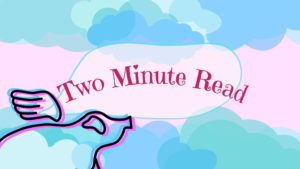
There Are Two Kinds Of People – Conclusively.
We have all heard it said before: “there are two kinds of people…” Sometimes it’s used to try and drive a point, and sometimes it’s used for comedic appeal. My favorite rendition of this phrase to date is this:
“There are two kinds of people; those who believe that there are two kinds of people, and those who don’t.”
I find this sentiment hilarious, but it also happens to be very applicable to the idea I wish to share today.
As you read, keep in mind that this is only something that I theorize, and if I tend to talk in absolutes or as if I am stating facts, take it with a grain of salt. In other words, I encourage you to draw your own conclusions from the things I’ve pondered.
At our cores, I think that there are one of two lenses through which we tend to naturally view the landscape of life, or interpret information, though I think it’s more of a spectrum or a sliding scale than it is concretely ‘one or the other.’ I think we tend to be either more logically driven, or emotionally driven. Better put, I think we are either more “How-Based” or “Why-Based.”
To figure out which way of living you veer more towards, think back to the last time you were met with conflict. Was your initial instinct to wonder, “how do I fix this?” or “why is this happening?” Of course, to find resolution, we will all ultimately ask both questions, but it will be one or the other that we feel naturally inclined to focus more of our attention on and explore most completely.

“How-Based” people will have an easier time understanding and communicating with other “How-Based” people, as “Why-Based” will with “Why Based.” This is a tricky truth though.
A collection of “How Based” people will be able to quickly draw a practical and functional conclusion. They will work well alongside one another, finding it easy to navigate their black and white ideas of “yes” and “no,” or “this works” and “this does not.” They will be swiftly forward moving, and they will not rest until the task at hand is complete. They are factual and logical, and they thrive off new and proven information. A collection of “How Based” people ensures productivity and effective use of time-management.
A collection of “Why Based” people will dive eagerly and endlessly into deep subject matter. They will not tire as they venture through all avenues of a profound idea, and they will float off together through emotional expression and intense imagination. They are wonderous of magic; conversation between them sparks new ideas boundlessly. They are greatly empathetic and entirely understanding. A collection of “Why Based” people can carry a dream to the fullest extent of the dream’s potential.
Regardless of whichever category you fall into the most, you will probably find that conversation or exploration with people whose natural response is alike your “How” or “Why” to feel tremendously rewarding. If you’ve ever found yourself excited and enthralled in a conversation where the person you’re sharing with seems to carry your ideas, opinions, and thoughts in an elevating and delightful way, if their absorption and additions to your words perfectly reflects your views in a manner that almost feels profound, then you know how gratifying a likeminded reward can be. The more gleefully engaged and eager to give input in a conversation you are, the more likely it is because you’re keen to their reaction as it mirrors your own. “How” people that engage with other “How” people often find that the conversation and ultimately, the conclusion of it feels like a breath of relief, and the same can be said when “Why” engages with “Why.”
However, here’s where things start to get tricky…

Spending too much time within your own suit is what builds echo chambers. It’s what leads people into cults, and it’s what solidifies extremist opinions – of any kind.
Whether we’re more inclined to ask “how” or “why,” either question will lead us to eventually asking the other, but “How-Based” people will only ask “why” enough to conclude their how, and just the -same, “Why-Based” people will only ask “how” enough to carry forward their “why.” It feels exponentially gratifying to get caught up in conversation with people who operate similarly to us, but we stand the best chance of finding the greatest possible answers and the most well-rounded resolutions when we turn to those that oppose our natural instincts. In other words; we get a more complete conclusion if we’re able to find the answer to both the infinite “How” as well as the “Why.” Communicating with the opposition, however, can be challenging, as it forces us to fit our feet into the opposer’s shoes.
Like I mentioned before, I believe that the “two kinds of people” I’m referring to in this piece lands somewhere on a spectrum, instead of being two disconnected ideas. Evidence in that, is how I said just recently that asking “why” leads to eventually having to ask “how” and vice versa, but there are those that are more naturally inclined to ask both questions extensively, and there are those that are less inclined. The closer you are to the center of the spectrum, the easier you will find it is to understand and digest an opposing point of view. The further away you are however, the more difficult you will find the task, but also – the further away you are, the more important it becomes that you do try to understand.
[Side note: There is also a lot of overlap in the spectrum. An example that comes to mind that I’ve seen commonly is a person who tends to answer “How” to questions that don’t affect their personal lives or emotional states, but “Why” to questions that do.]

Here is where I believe the disconnect in communication and understanding happens:
“How-Based” people respond the best and are most willing to reciprocate when they’re presented with facts, clarity, lists, and evidence to back up claims. Interjecting emotion into reason muddies the landscape for “How-Based” people, which makes it more difficult for them to absorb information and often causes them to shut down and disregard your standpoints altogether. They want concise building blocks of information that snap together easily and well; “grey areas” slip through the cracks of the structure and they don’t fit the way the rest of the Lego does, so to “How Based” people, it doesn’t make sense to have the abstract involved at all. They know how to complete a task, and they only want the pieces necessary for finishing the task as efficiently as possible. They’re also far more focused on ‘fixing’ issues that are present, and they want resolve immediately. They think in what is happening ‘now.’
“Why-Based” people respond the best and are the most willing to reciprocate when they’re presented with ideas, imagination, emotion, and concepts. They desire to run wild with a topic and they are naturally more intrigued by what might happen in the future as a result of an issue, than they are by figuring out how to resolve it now. They are completely compelled and driven by emotional flavorings in a storytelling, and the chance of emotional resolve is a “Why-Based” person’s biggest motivator in wanting to create change or find a satisfying solution. A “Why-Based” person will grow bored and their attention will turn off if they’re given a list of too many facts without emotional reason. Structured logic is not compelling, but a moving story is. A “Why-Based” person may also feel attacked personally if they’re disregarded by a “How-Based” person when expressing their points emotionally.
In short, the disconnect; we can not reach the instinct opposing our own if we are not willing to entirely remove ourselves from processing the way we feel most comfortable. If we do not understand how the opposing instinct processes, we will never reach them, no matter how passionate we are in our stance.

So, how do we unclog the pipes? I think we need to understand, evaluate, and embrace (what I am deeming):
The Three Loud “R’s” and The One Quiet “r” Of Fluid Communication
Loud “R” 1: Recognize
Understand what is being conveyed. Remember, understanding is not synonymous with agreeing.
Recognize in yourself:
- The types of viewpoints you’re more ready and eager to recognize [Are you “How-Based” or “Why-Based”?] What topics promote your desire to participate in conversation? What are you excited to express? What do you value?
- The types of viewpoints you’re more ready and eager to disregard. What makes you power down? What opinions aggravate you? What format of explanation loses your interest: emotion or logic?
Recognize in your opposing instinct:
- Which format are they the most likely to introduce their perspective to you in? How can you adapt how you absorb so you can more easily recognize their stance?
- How can you alter how you phrase your opinions and ideas to make it easier for them to recognize you?
- Their body language: address their behaviours and shift your language to match what they need to hear from you, so they can be ready to recognize what you need to say to them.
Loud “R” 2: Receive
Absorb and digest. Be attentive, thorough, and careful in processing information, especially if it isn’t appealing to you.
In yourself:
- How motivated are you to receive ideas or opinions you do not agree with? How can you increase your motivation?
- How do you typically receive information? If you’re more compelled by emotion, what emotional responses can you apply to the information you’re receiving to be able to absorb it more completely? If you’re logically compelled, what can you pinpoint in the statements they’re providing so you can build from there, your foundation of understanding?
- Where do you shut down? What do you need from them in order to interpret their point of view more clearly, and how can you communicate that with them so they can deliver their words in a way that is easier for you to digest?
- Most importantly: ensure you are communicating to learn, and not just to prove your point of view. The more you are willing to understand opinions that are different from yours, the more likely you are to find the best plausible outcome. Look at every new perspective you encounter as an opportunity to discover value and dig into every perspective until you’ve found that value.
In the opposing:
- What methods of communication can you apply that would help them want to hear you?
- Are you paying attention to how they’re reciprocating you, and are you prepared to adjust on the fly to keep them engaged?
In Either:
- Maintain engagement! What are your strategies to ensure both parties are eager and willing to stay engaged?
Loud “R” 3: Respond
Instinctive response is almost always beyond our control. You know immediately what your gut feeling on something is, but it’s important to dissect your response as carefully as you are your opposing words, so that you can be sure the conversation finalizes in a way that is either as close as possible to a universally gratifying truth, or at least – you and your opposer both feel satisfied and heard and have found a take away from the conversation at large.
In yourself:
- Force yourself to battle the desire to terminate the topic after you’ve felt your first response to it. Instead, explore your response until you find a place where you can meet your opposer somewhere halfway.
In the opposing:
- Have a plan for if you see their response to be terminating. What can you lend to them to motivate them again to want to meet you?
Quiet “r:” (in a way that) Resonates
If you can not find a way to resonate with your opposing instinct, or if you can not adjust your phrasing in a way that helps them resonate with you, then you are not communicating. You are only taking turns making statements without any give or take in understanding one another. The Quiet “r” is the most important because without it, we will grow quickly frustrated with the opposing and we will want to retract back into a field of people with the “How” or “Why” instinct that naturally resonates with us. The Quiet “r” is the difference between communication with the opposing being difficult and seemingly impossible, and it being easy and gratifying.

I think it is extremely important to have both “Why-” and “How-” based people integrated into your life. I believe that instincts alike yours help drive you forward while instincts opposing yours help you to check in and ensure you’re steering in the right direction. However, it can be difficult to allow the opposing into your life. I think that the two strongest motivators in being receptive to opposing ideas are:
- Having someone that opposes your natural “How” or “Why” instinct in your life that you care a great deal for.
- Being comfortable in knowing your beliefs can very well be faulted. I think finding that comfortability is deeply rooted in how adamantly you fight for your own wellbeing.
If you have both (and especially if you’re already closer to the center of the spectrum,) then the more motivation you will have to recognize, receive, and respond to the opposing. If you lack one or the other, you will find it more difficult – and it will be the most difficult of all if you lack both. It’s best to find your reason for value in both first, and it’s crucial to be honest with yourself while you’re in the process of it.

Now, let’s talk about the different kinds of combinations of “How’s” and “Why’s” that may be in your life.
If you have a ratio of opposing:alike that’s 2:1 or greater, I think this has great opportunity to be an incredible combination of those you engage with; so long as the communication between you and them is healthy and fluid – and remains that way. Otherwise I think eventually, you will begin to feel outnumbered and small and you’ll likely grow aggravated and struggle with believing you’re never being heard.
If you have a ratio that’s 1:1, I think this stands the best chance of creating the healthiest foundation for you and your life. Those alike you will encourage you to grow and expand. They will be your cheerleaders and your best teammates. They will fill you with ambition and spark you with drive. Those opposing you will continue to challenge you at every corner. They will help you stay sharp and bright, and they will be a good anchor for you to keep you humble and grounded.
If you have a ratio that’s 1:2 or greater, I think that this is the unhealthiest combination. If you feed too much and too often off opinions and ideas akin to yours, you increase your likelihood of becoming static. You need to be challenged sometimes, or submerged in new ways of thinking, or your ego will begin to reject any ways of thinking other than your own, and you will close off any room you would’ve otherwise had to grow.

In conclusion:
I believe there are two kinds of people – those who are more “How-Based” and those who are more “Why-Based,” but I think we should all seek to be somewhere in the middle of the spectrum. It is my hypothesis that we will all get along better and learn a lot more if we practice fluid communication.









Greg Johnson
That was a really interesting observation Danika! Getting logic and emotion to coincide on the same track can be tricky. If we enter into a discussion with a willingness to find the closest truth, a great obstacle can become the cognitive dissonance that happens, if we learn something that contradicts our understanding. It can create a very uncomfortable wave that in turn changes many things that we had believed. It may take great and painful work to recalibrate all of our predisposed stances back into the new better alignment. Not easy! Power to those who are willing to change their mind. Loved the blog!!
Danika
I absolutely love your paragraph comments, I hope you know that. I love exploring your mind, too! You have so much wisdom & I’m glad my blog seems to reflect you way of thinking in many ways.
Rachel Rivera
Studying types and personalities are so interesting!
Danika
I agree completely! Thank you for reading. I hope you return here again! <3
Adriane
This is good advice. I definitely struggle in the receiving department.
Danika
Well, knowing where you’re lacking is a good step towards self-improvement, & I believe there’s always room for that! Thank you so much!
Wildrose Healer - Karen
I understand what you by the “how-based” people and the “why-based” people, I see this between my husband and I. 2 different side of a spectrum, or yin-yang as I like to say. At the end of the day, when those two people come together there is a balance, or as you mentioned, you learn from each other.
Wonderful post, this is a great party conversation.
wildrosehealer.com
Danika
Thank you very much! I get the feeling you and your husband encourage a great amount of growth within each other.
I hope you return here again, soon. <3
성인용품샵
Very good info. Lucky me I recently found your site by
accident (stumbleupon). I have saved as a favorite for later!